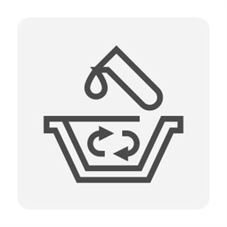Wastewater Treatment Chemistry
The essence of our business is the supply of wastewater treatment programs required for wastewater compliance. Every wastewater stream is unique. Even within the same industry, we have found that the nature of wastewater at different plants can vary markedly. Northland Chemical evaluates the nature of the wastewater at each plant and formulates the optimal chemical program for each plant individually.

pH Control
Many plants produce wastewater that is acceptable to the municipality but still needs to be pH adjusted prior to discharge. Northland Chemical supplies pH control equipment, chemicals required for pH adjustment and importantly, the expertise required to set up pH control equipment so that performance is ensured over time.
Solids Removal
The addition of treatment chemicals is sometimes required in situations where the particles to be removed from the water are too small to be removed from the water using the available technology. The role of treatment chemicals is to agglomerate particles together so that they become larger in size and can then be removed from the treated water via filtration, flotation or settling.
The chemical programs developed by Northland Chemical fall into three categories: Liquid Programs, Dry Programs and Hybrid Programs.
Liquid Programs
With liquid programs, each chemical required for the treatment process is applied separately (in sequence) as a liquid. The dosage of each liquid component of the program is controlled individually. For some plants, this provides an opportunity for treatment optimization and cost reduction while for others, it is an added burden. The circumstances of the plant, together with the nature of the wastewater, determine whether a liquid program is desirable. Liquid programs are preferred in higher volume applications as well as for applications in which trained personnel are available to operate the system.
A liquid program generally has three components:
- pH adjustment
- Coagulation
- Flocculation
The chemical treatment program is designed so that these three components work together to provide consistent results. The heart of the program is the coagulant, which must often be custom formulated to achieve optimal performance. Northland Chemical excels in the development of such formulations.
pH adjustment is far from trivial, as significant expertise is required to set up pH control to minimize the use of chemicals and to achieve consistent results.
Flocculation is often overlooked. Having the right flocculation system is of key importance to making the system performance consistent and user-friendly. Here again, there are often great opportunities to minimize chemicals consumption as well as to operate the system attentively.
Dry (Clay) Programs
With dry programs, the chemicals required for the treatment process are blended together and supplied as a dry powder. This greatly simplifies the treatment process. The chemical process is usually accomplished in one single step. The dry powder is added to the water to be treated. After agitation, the clarified water is ready for filtration in order to remove the solids which have been separated from the water.
Dry programs formulated by Northland Chemical are often based on sodium bentonite clay, which encapsulates contaminants and forms an easily filtered sludge. Separation of the agglomerated contaminants from the clarified water is done by simple filtration. The resulting sludge is usually suitable for disposal in landfills.
Dry programs are generally much easier to operate than liquid programs. While the cost per liter treated is higher with dry programs than with liquid programs, the simplicity of operation and lower capital costs make dry programs cost-effective for volumes up to 5,000 gallons per day. The circumstances at each plant, coupled with the nature of the water to be treated, ultimately determine the optimal program choice.
Hybrid Programs
Hybrid programs are used when a dry program is desired but the treatment program requires an elevated demand of a specific chemical. To minimize the program’s overall treatment cost, that high volume chemical can be supplied as a liquid. One example is the use of sodium hydroxide for pH adjustment. Another example is the use of a liquid coagulant in conjunction with a clay program.
Northland Chemical’s approach is flexible. We are able to utilize the technology that works best in each particular case.
The essence of our business is the supply of wastewater treatment programs required for wastewater compliance. Every wastewater stream is unique. Even within the same industry, we have found that the nature of wastewater at different plants can vary markedly. Northland Chemical evaluates the nature of the wastewater at each plant and formulates the optimal chemical program for each plant individually.